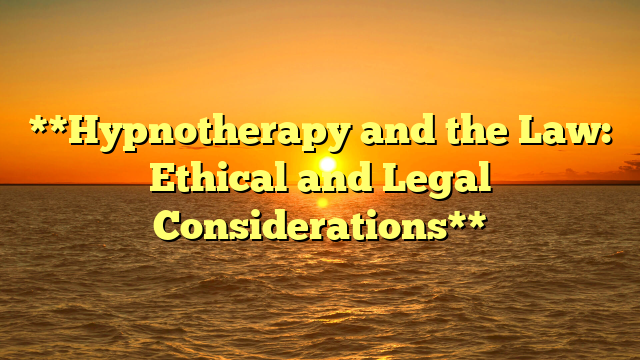
Hypnotherapy is a powerful therapeutic tool that has been used to help individuals manage a range of conditions, including stress, anxiety, chronic pain, and behavioral issues like smoking cessation. As the practice grows in popularity, however, it raises important ethical and legal considerations that both practitioners and clients must understand. Hypnotherapy involves accessing the subconscious mind to facilitate positive change, but the potential for abuse or misapplication of such influence necessitates careful attention to ethical standards and legal regulations. This article explores the key ethical and legal issues surrounding hypnotherapy practice.
**Ethical Considerations in Hypnotherapy**
**1. Informed Consent**
Informed consent is a cornerstone of ethical practice in any form of therapy, including hypnotherapy. Before beginning a session, it is essential that the hypnotherapist explains the nature of hypnotherapy, its potential benefits, and any risks involved. The client should fully understand the process, the intended outcomes, and any potential side effects or limitations of treatment. Informed consent ensures that the client is aware of what to expect and can make an educated decision about whether to proceed with therapy. This transparency also helps to establish trust between the hypnotherapist and client.
**2. Client Autonomy**
Hypnotherapy should never be used to manipulate or control a client. It is important that the client remains in control throughout the session, and the hypnotherapist should respect the client’s autonomy. Hypnotherapy is meant to guide individuals toward positive change, not to impose the hypnotherapist’s desires or beliefs on the client. Clients should always have the option to stop a session at any time, and their decisions and preferences should be respected. samosir88 or undue influence is not acceptable, and a hypnotherapist must be careful not to suggest actions or behaviors that are against the client’s best interests.
**3. Confidentiality and Privacy**
Like other forms of therapy, hypnotherapy requires strict confidentiality. Information disclosed during a session should be kept private, and the hypnotherapist should protect the client’s personal data. Exceptions to confidentiality may arise in cases where there is a risk of harm to the client or others, but these should be clearly outlined at the beginning of treatment. Clients must feel safe and supported when engaging in hypnotherapy, and confidentiality is vital for maintaining this sense of security.
**4. Competence and Professional Boundaries**
Hypnotherapists are responsible for ensuring they are properly trained and qualified to practice. Practitioners must continually update their skills and knowledge to maintain a high level of competence. Additionally, maintaining professional boundaries is essential to avoid conflicts of interest or exploitation. Hypnotherapists should never take advantage of a vulnerable client, and any personal relationships or interactions outside the professional setting should be avoided to preserve the therapeutic relationship.
**Legal Considerations in Hypnotherapy**
**1. Licensing and Regulation**
In many countries and regions, hypnotherapy is not as strictly regulated as other forms of medical or psychological treatment. However, some jurisdictions require practitioners to obtain certifications or licenses to practice hypnotherapy. It is essential that hypnotherapists are aware of the legal requirements in their area of practice, including any necessary certifications, insurance, or continuing education. Working without appropriate credentials can lead to legal consequences and harm to both the client and the practitioner’s career.
**2. Scope of Practice**
Hypnotherapists must be clear about the scope of their practice and the limitations of their training. Hypnotherapy should not be used as a substitute for medical treatment, especially in cases where the client has serious psychological or medical conditions that require a licensed physician or therapist. Hypnotherapists should recognize when a client’s needs exceed their expertise and refer them to a more appropriate professional. For example, a hypnotherapist should not attempt to diagnose or treat severe mental health conditions like schizophrenia or bipolar disorder without proper qualifications.
**3. Use of Hypnosis in Legal and Forensic Settings**
Hypnotherapy is sometimes used in forensic settings, such as retrieving memories or details about criminal events. However, the legal and ethical implications of using hypnosis in these situations are complex. The accuracy and reliability of memories retrieved under hypnosis are often questioned, and there is the potential for false memories or suggestions to be implanted. In many legal jurisdictions, the use of hypnosis in court cases is limited or prohibited. Hypnotherapists working in legal settings must be aware of these regulations and exercise extreme caution to avoid legal repercussions.
**4. Malpractice and Liability**
Like other healthcare professionals, hypnotherapists may be held liable for malpractice if they fail to adhere to ethical and legal standards. If a client is harmed due to the hypnotherapist’s actions, such as through improper conduct or failure to follow established protocols, the therapist could face legal action. Practitioners should maintain appropriate malpractice insurance and take steps to protect themselves legally while ensuring they provide safe, effective care.
Hypnotherapy can be a highly effective therapeutic tool, but it must be practiced within a framework of ethical and legal standards. Informed consent, respect for client autonomy, confidentiality, and professional competence are essential ethical considerations for any hypnotherapist. Additionally, legal aspects such as proper licensing, scope of practice, and liability need to be understood to ensure that hypnotherapists operate within the bounds of the law. By adhering to these guidelines, hypnotherapists can provide safe, respectful, and effective treatment, ensuring positive outcomes for clients while protecting both themselves and their clients from potential harm.




